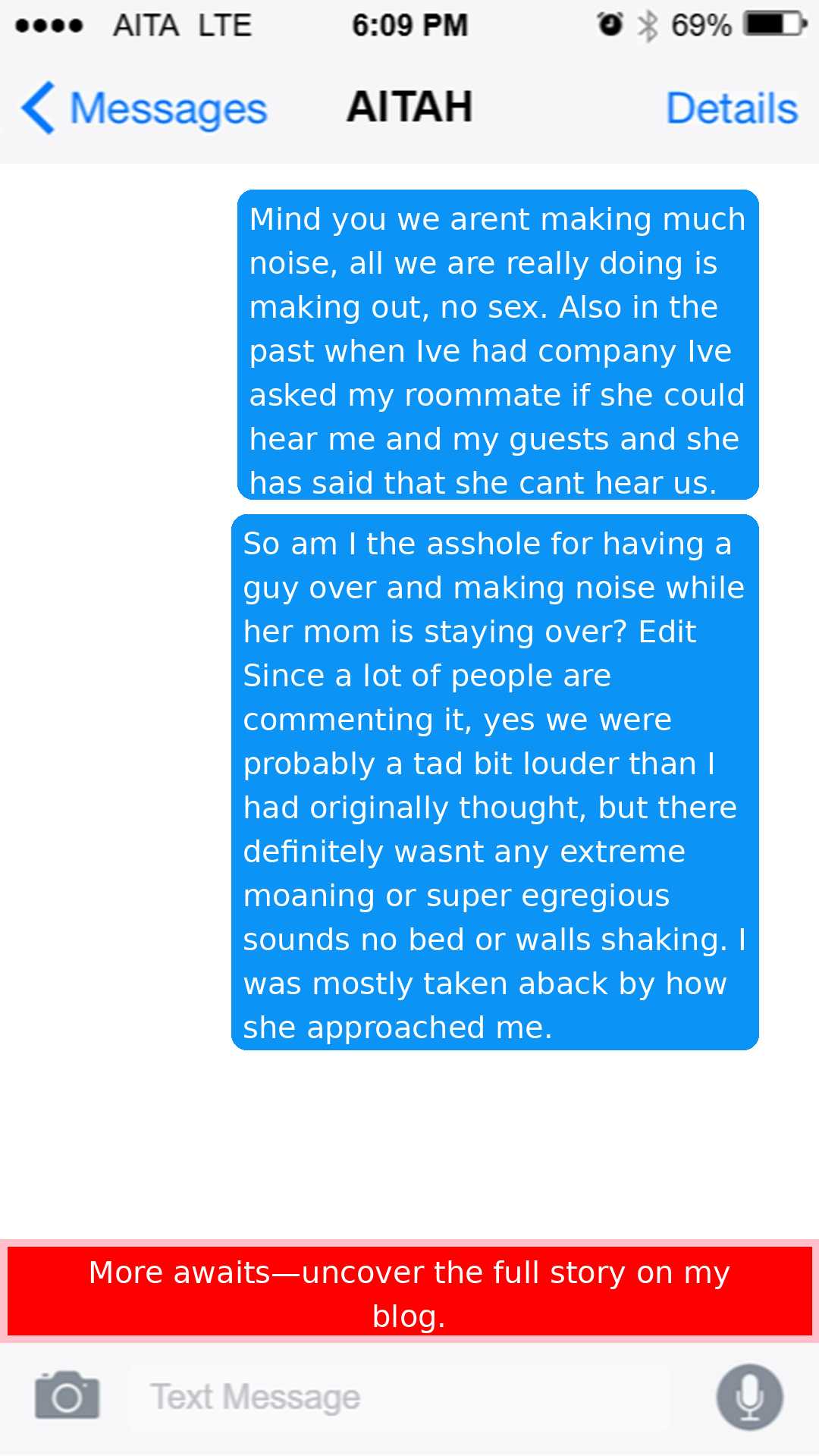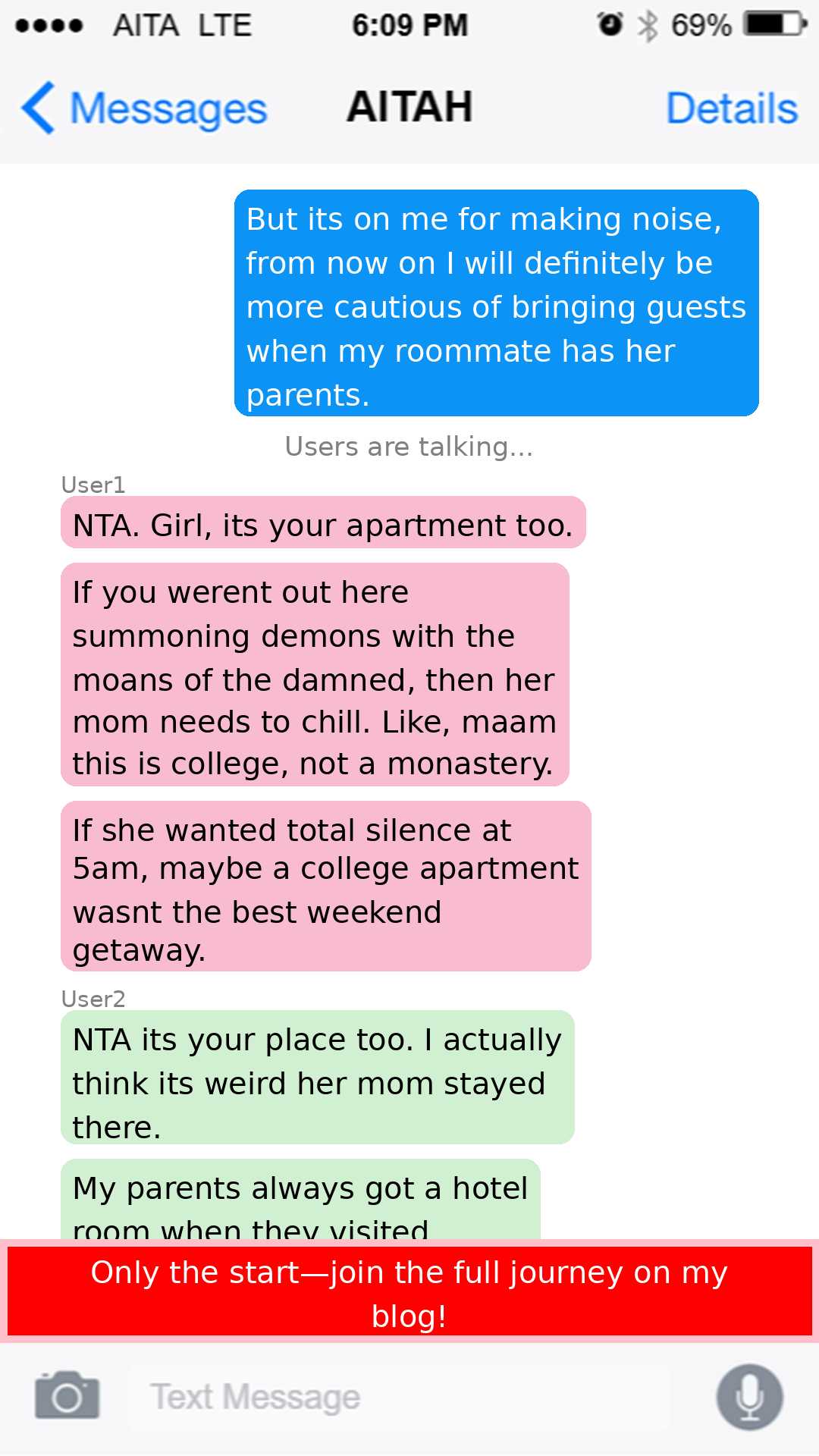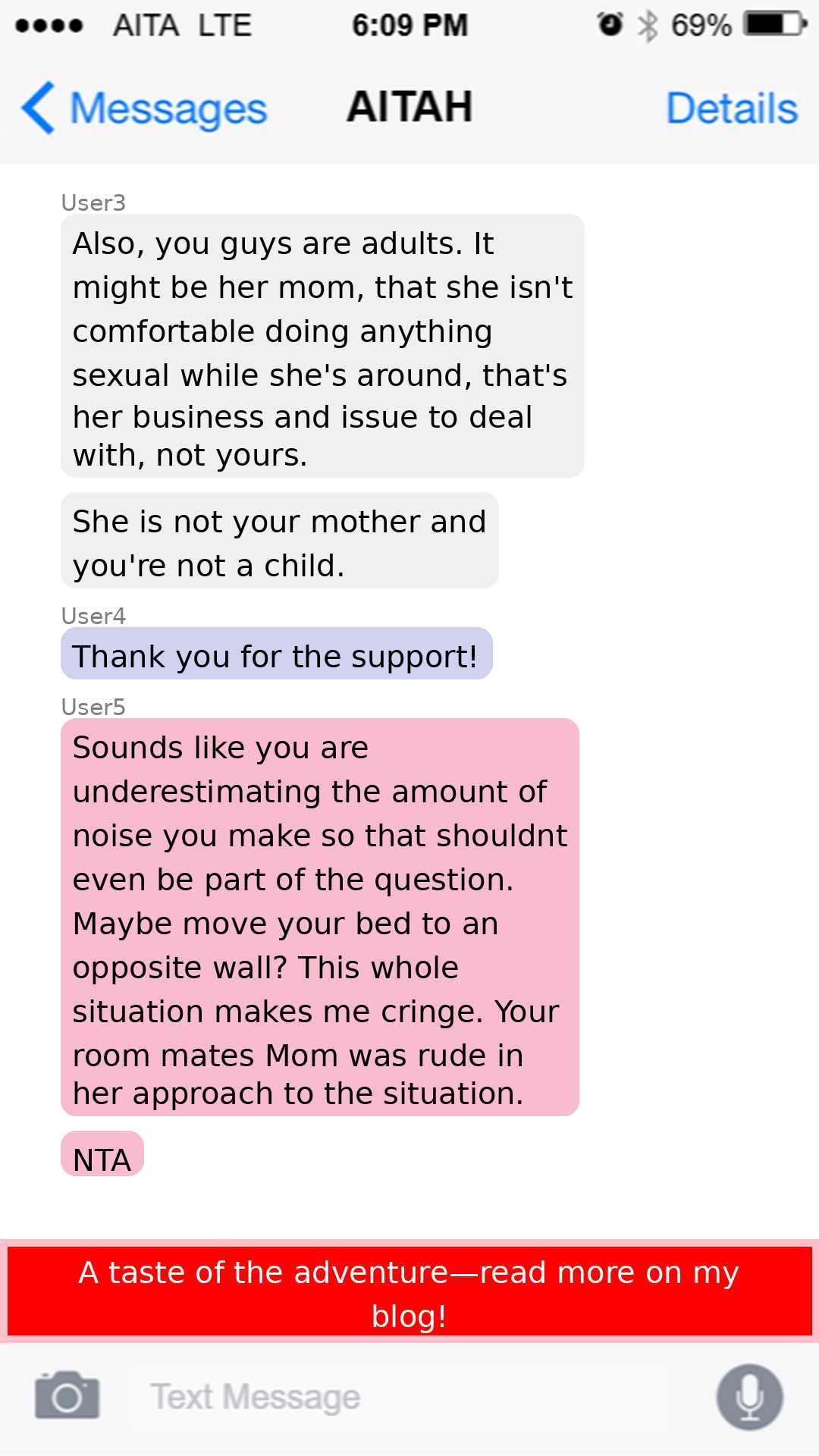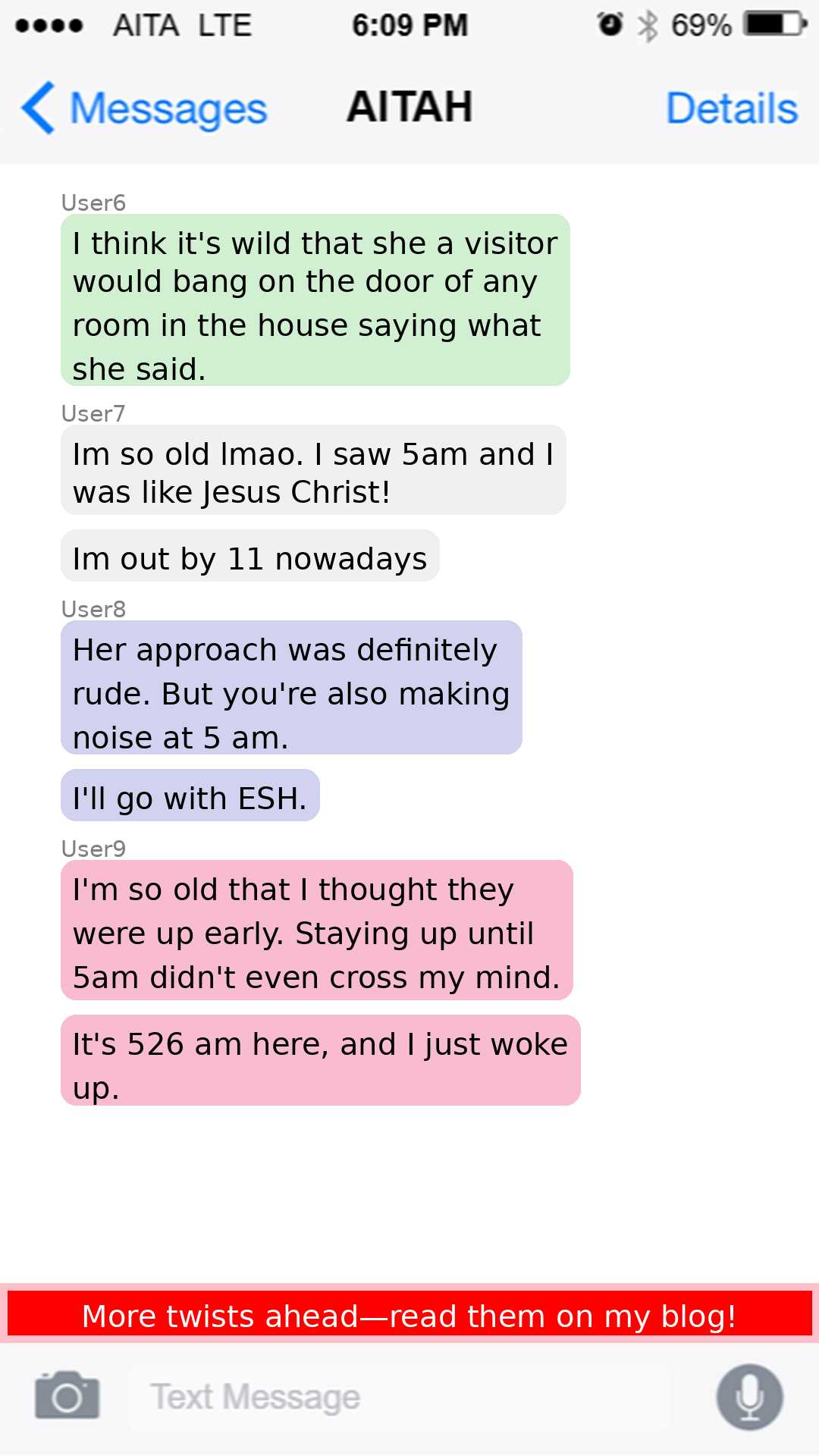AITA, My roommates mom banged on my door when I had a guy over and said “shut the fuck up”
 Image credit: Pixabay (This is example image – Not the actual photo)
Image credit: Pixabay (This is example image – Not the actual photo)
Roommate Drama: A Late-Night Dilemma
In a college apartment shared by four roommates, a late-night encounter takes an unexpected turn when one roommate’s mother intervenes. After a night of innocent making out, the mom’s loud request for quiet leaves the young woman questioning her actions. This relatable scenario highlights the challenges of navigating personal space and boundaries in shared living situations, a common struggle for many young adults in the U.S. as they balance independence with communal living.
Roommate Conflict Over Noise During Family Visit
In a college apartment setting, a conflict arose between roommates due to noise levels during a visit from a family member. Here’s a breakdown of the situation:
- Background: The narrator, a 19-year-old female college student, shares an apartment with three other roommates.
- Family Visit: One of the roommates, also 19, had her mother staying over for the weekend.
- Evening Activities: On a particular night, the narrator had a male guest over. They engaged in light physical affection, primarily making out.
- Noise Complaint: Around 5 AM, the mother of the roommate knocked on the narrator’s door and expressed her frustration, asking them to be quieter.
- Previous Communication: The narrator had previously checked with her roommate about noise levels when having guests, and the roommate indicated that she could not hear them.
After the incident, the narrator reflected on the situation:
- Self-Reflection: The narrator acknowledged that they might have been slightly louder than initially thought, although they insisted there were no extreme sounds or disruptive activities.
- Response to Conflict: The narrator felt taken aback by the mother’s approach but recognized that it was her responsibility to be more considerate of noise levels, especially when family members are visiting.
- Future Considerations: Moving forward, the narrator plans to be more cautious about having guests over during times when her roommates have family visiting.
This situation highlights common themes in college living, including family drama, wedding tension (in terms of family dynamics), and the importance of conflict resolution among roommates. It serves as a reminder of the need for open communication and consideration for others in shared living spaces.
This is Original story from Reddit
 Image credit: Pixabay (This is example image – Not the actual photo)
Image credit: Pixabay (This is example image – Not the actual photo)
Story
I, F19, live in a college apartment with three other roommates. The roommate who lives right next to me, F19, had her mom stay the weekend with her in her room. Tonight, I had a guy over, and nothing crazy happened; around 5 AM, we started to fool around.
The mom then bangs on my door and says, “Can y’all shut the fuck up?” Mind you, we aren’t making much noise; all we are really doing is making out, no sex. Also, in the past, when I’ve had company, I’ve asked my roommate if she could hear me and my guests, and she has said that she can’t hear us.
So, am I the asshole for having a guy over and making noise while her mom is staying over?
Edit
Since a lot of people are commenting on it, yes, we were probably a tad bit louder than I had originally thought. However, there definitely wasn’t any extreme moaning or super egregious sounds—no bed or walls shaking. I was mostly taken aback by how she approached me.
But it’s on me for making noise. From now on, I will definitely be more cautious about bringing guests when my roommate has her parents over.
View the Original Reddit Post Here
Summary of Reddit Comments
The top Reddit comments indicate a strong consensus that the original poster (OP) is not at fault (NTA) for the noise made in their apartment, as it is shared space and they are adults. Many users emphasize that the roommate’s mother overstepped by intervening and that the roommate should address her discomfort directly rather than relying on her mother. Overall, the comments suggest that the situation reflects a lack of communication and boundaries rather than a significant moral failing on the part of the OP.
Verdict: NTA
Expert Advice for Resolving the Roommate Conflict
Conflict in shared living spaces is common, especially in college settings where individuals are still learning to navigate boundaries and communication. Here are some practical steps for both the narrator and her roommate to resolve the situation amicably:
For the Narrator
- Reflect on the Incident: Take some time to consider the feedback from the roommate’s mother. While you may feel justified in your actions, acknowledging that noise can be subjective is important.
- Communicate Openly: Approach your roommate for a candid discussion about the incident. Ask her how she felt about the noise and if there are specific times when she prefers a quieter environment.
- Set Boundaries Together: Work with your roommate to establish clear guidelines for noise levels during family visits or other important times. This can help prevent future misunderstandings.
- Be Considerate in the Future: When planning to have guests over, especially during times when your roommate has family visiting, consider keeping the volume down or choosing a different time to avoid conflict.
For the Roommate
- Address Concerns Directly: Instead of relying on your mother to voice your discomfort, communicate directly with your roommate. This fosters a more mature and respectful relationship.
- Express Your Feelings: Share how the noise affected you and your family visit. Use “I” statements to express your feelings without placing blame, such as “I felt uncomfortable when I heard noise late at night.”
- Encourage Open Dialogue: Invite your roommate to share her perspective as well. This can help both of you understand each other better and build a stronger roommate relationship.
- Establish a Roommate Agreement: Consider creating a roommate agreement that outlines expectations for noise levels, guests, and other shared living concerns. This can serve as a reference point for future conflicts.
Conclusion
Conflict resolution in shared living spaces requires empathy, communication, and a willingness to compromise. By taking these steps, both the narrator and her roommate can foster a more harmonious living environment and strengthen their relationship as roommates.
Join the Discussion
 Image credit: Pixabay (This is example image – Not the actual photo)
Image credit: Pixabay (This is example image – Not the actual photo)
What do you think? Would you have handled this differently?
Share your thoughts below! Vote: Do you agree with Reddit’s verdict?









